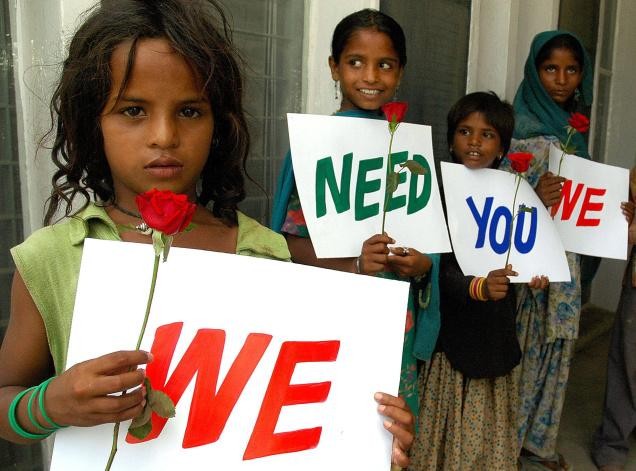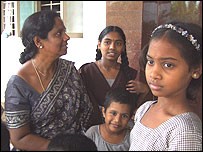Below is the article appeared in the "The Hindu", plz. go thru this,
This is a social evil needs urgent attention. In spite of being widely reported/covered our establishments are not serious about the problem.
Barefoot - Unwanted daughters
Harsh Mander

The Hindu Surviving technologies of elimination. Photo: Akhilesh Kumar
The skewed s*x ratio in our society holds a mirror up to what we are and what we have become.
India is one of the few countries in the world in which there are fewer women and girls than men and boys: their share in the country's population has declined continuously over the past century. The census of 2001 revealed that for every 1000 males, there were only 946 females. If women and girls are ceded the same life chances as men and boys, including health care and nutrition, there would be roughly equal numbers of females and males. Instead, there were 35 million fewer women and girls than men and boys in 2001. In a stark sense, what these figures establish beyond doubt is that social, cultural — and increasingly technological — processes of discrimination, neglect and hostility have extinguished life chances of these many million ‘missing' girls and women.
Exposed
These figures hold up a mirror to society, to what we are and what we have become. They reveal the enormity of violence and injustice that hides muffled within the most intimate spaces of our families. They expose the cumulative consequences of ingrained cultural beliefs about the dispensability and devaluation of women. They show how material concerns, of land ownership and ‘lost' investment in girls who go to other families, override the love for offspring which nature fosters. And the declining figures of female ratios illustrate the greatest paradox, that modernity — and with it, wealth, education, and reproductive healthcare — has not reduced but instead further aggravated this country's aversion to its daughters.
Even more worrying today is the recent accelerated fall in child s*x ratios or ratios of girl children to boys, which collapsed to the lowest ever in 2001. A major recent study titled ‘Planning Families, Planning Gender', supported by Action Aid India and the International Development Research Centre, Canada, describes as particularly disorienting and counter-intuitive the finding that it is often the most wealthy and literate who are today leading in eliminating their daughters. Some of the country's most prosperous states with high literacy rates, like Punjab, Haryana, Gujarat and Maharashtra show the sharpest declines in child s*x ratios, as do rich and ‘modern' cities like Delhi, Chandigarh and Ahmedabad.
This study, stewarded by feminist scholars Mary John, Ravinder Kaur, Rajni Palriwala, Saraswati Raju and the late Alpana Sagar, and guided also by Navsharan Kaur, broke new ground by searching for the everyday practices, concealed within families and communities, that explain these paradoxes. Research scholars lived for more than six months each in villages and towns in five districts of North India with the lowest s*x ratios: Morena in Madhya Pradesh; Dholpur in Rajasthan; Kangra in Himachal Pradesh; Rohtak in Haryana; and Fatehpur Saheb, Punjab.
The study unearths several ‘technologies' that are used to eliminate females, especially girl children. Historically, the killing of female infants was practised in all these sites. Now vestiges of these practices are still found. In Morena, people spoke of many infant girls killed in a Thakur's house, such as by filling the infant's mouth with tobacco, and throwing her body into a drain. In Dholpur, infant girls were fed seeds from a poisonous plant, or dropped from a height. A particularly grisly narrative from Morena is of one Motti Bhua, a midwife who was commandeered to kill girls soon after their birth. She used to keep one leg of the stool (peedhi) on the neck of the infant and sit on it while saying, ‘Go, bitto (baby), you go and send your brother'.
Another strategy is of deliberate neglect of little girls, which is ultimately fatal. Noticed again in Morena and Dholpur, this involves withholding food and essential health services from girls, and not from boys. In Dholpur, a man said his daughter died due to illness. His wife shouted from inside the house, “The truth of the matter is that he ‘ate' her. I told him to take her for treatment, but he remained careless, because of which she died.”
And then of course there is the peculiarly ‘modern' surge in s*x selective abortions which, although illegal, flourish in all five states. The law prohibiting these practices is openly flouted; researchers discovered a close nexus between local government nurses and doctors, and unscrupulous private radiologists and gynecologists. A woman in Punjab said, “Today's women do not have to make guesses. Get your ultrasound done, and you know what there is.” Another in urban Kangra confided, “It was a girl and the doctor asked what we wanted to do. We wanted to abort it. We paid Rs. 1200, and got it over with. What would we have done with another girl?”
Right to choose
The agents for eliminating daughters are frequently women — midwives, mothers-in-law and even mothers — but the study illustrates that women rarely are empowered to make independent choices. A range of kin, especially elders, and even neighbours, choose if a girl is to be allowed to live.
Another irony highlighted by the study are of the unintended consequences of key government heath strategies, such as promoting small families, prenatal care including ultrasound checkups, and legalising abortions. The study finds that smaller families are widely becoming the aspirational norm. But family planning now means ‘planning for families with sons and preferably without daughters; and certainly no more than one daughter'. Ultrasound and legal abortions facilitate the detection and elimination of unwanted female foetuses.
In many places, but particularly in Punjab, people grumbled about the uselessness of sons. I heard this many times in my own visit to Fatehpur Saheb in connection with this study. “They neither work the land, nor do they have jobs, do not do well in their studies, and get into ‘bad habits'.” There is very high alcoholism and drug abuse found among young men in Punjab. They also are much less inclined to take care of their parents. Even so, the study found a more thorough elimination of daughters before they are born in Punjab than in the past.
The authors explain this puzzle by the socio-cultural practices which prescribe that a girl leaves her parental home after marriage, so that her husband's family gains rights over her productive and care labour and her reproductive capacities. Dowries add to the cost of ‘giving her away'. There is less a son-preference, and more an aversion to daughters, who are a certain economic loss. A further paradox is that progressive policies such as inheritance rights for women, and higher age of marriage, make them even more of an economic ‘liability', since expenditure on them and property owned by them will only benefit another family. It is mainly for economic, material reasons that we are taking away the lives of our daughters, which override all other emotional and ethical considerations.
The research throws up formidable challenges to public policy. A whole range of progressive measures for women's rights — maternal health services, the right to abortion, more education, gender-just rights to inheritance, and higher age of marriage — have actually further reinforced traditional aversion to daughters. The authors of the study suggest that real change will come only when social norms and practices are altered through sustained social reforms. These include encouraging parents to be able to choose to live with daughters, campaigns against dowry and expensive weddings, and enhancing the economic and social power of women within families. These are clearly long-term efforts; in the shorter-term, governments must act firmly against clinics, and health personnel, which assist s*x selective abortion; and make far greater public investments in healthcare, education and nutrition so that these reach girls and women and are not seen as financial burdens on the family. It is only when girls and women are more socially valued that they will survive in India. But until these measures gather impact, the grim and sobering reality is that millions of daughters will continue to be unwanted in our country.
https://www.thehindu.com/opinion/columns/Harsh_Mander/article600108.ece















